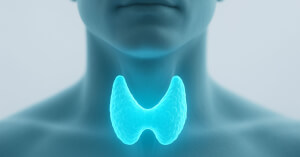
Iodine
Iodine is essential for proper thyroid function, aiding in the production of thyroid hormones that regulate metabolism and energy levels.
Iodine is a key mineral required for the production of thyroid hormones, which regulate metabolism, energy, and growth. It is commonly found in seaweed and iodized salt.
Deficiency can lead to goiter and developmental issues. Pregnant women have increased iodine needs for fetal brain development.
Iodine is used for thyroid and metabolic health. While essential, excess intake can disrupt thyroid function, so proper dosing is crucial.
Other names & forms of Iodine supplement : potassium iodide, lugol's iodine, nascent iodine, iodine supplement
Possible Benefits
Iodine is a critical trace element required for thyroid hormone synthesis, enabling proper regulation of metabolic rate, growth, and development.
- Helps support Hormonal Balance by facilitating thyroid hormone production and regulation.
- May improve Energy & Metabolism by ensuring efficient thyroid function and cellular energy production.
- Contributes to General Health by supporting cognitive development and preventing thyroid-related disorders.
Side Effects
Iodine is critical for thyroid function, but excess intake can cause mild effects. Watch for:
- Mild gastrointestinal upset, nausea or stomach discomfort, especially with large doses
- Possible headache or fever due to thyroid overstimulation
- Occasional rash or itching in those sensitive to iodide
- Temporary thyroid dysfunction, hyper- or hypothyroid symptoms, at extremes of intake
- Rare metallic taste or salivary gland swelling
Interactions
Possible interactions include:
- Thyroid medications: Iodine can affect thyroid dosing; if on levothyroxine, monitor thyroid panels closely.
- ACE inhibitors and diuretics: Can influence kidney function; check BUN/creatinine if used with lisinopril or furosemide.
Precautions
Before supplementing with Iodine, confirm none of the following apply to you. If they do, consult your healthcare provider:
- Individuals with thyroid disorders: Excess iodine can worsen hyperthyroidism or trigger hypothyroidism; monitor TSH/T4 levels
- People on thyroid medications: Avoid large supplemental doses without medical supervision
- Those with autoimmune thyroid disease (e.g., Hashimoto’s): Use cautiously; discuss optimal intake with your doctor
- Pregnant or breastfeeding women: Follow prenatal guidelines; avoid excess beyond recommended daily allowance
- Patients scheduled for surgery: Discontinue high-dose use at least two weeks prior, possible anesthesia and thyroid interactions
Studies
These studies provide scientific insights into Iodine benefits:
A 2016 randomized trial in 100 mildly deficient adults showed 150 μg/day potassium iodide for 6 months normalized TSH in 84% versus 22% with no supplement.
No placebo-controlled RCTs
have evaluated iodine for cognitive development in iodine-sufficient populations, though observational data link adequacy to neurodevelopment.Trials of iodine for thyroid autoimmunity suggest risk of exacerbation at high doses; no large RCTs define safe therapeutic ranges.
Disclaimer: This page is for educational purposes and does not replace medical advice. If you're pregnant, have a condition, or take medication, speak with a qualified professional.








